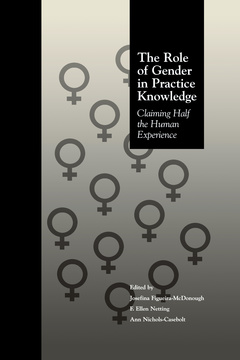Description
The Role of Gender in Practice Knowledge
Claiming Half the Human Experience
Social Psychology Reference Series
Coordinators: Figueira McDonough Josefina, Netting F. Ellen, Nichols Casebolt Ann
Language: English
Subject for The Role of Gender in Practice Knowledge:
Keywords
Social Work Group Educators; Ann Nichols-Casebolt; Social Welfare Policy Courses; Beth Glover Reed; Interactionist Family Theories; Cynthia Franklin; Advanced Generalist Practice; Dorothy N; Gamble; Peer Group Size; Edith Lewis; Policy Practice Courses; Elizabeth D; Hutchison; Generalist Practice Courses; Evelyn Smith Williams; Community's Social Goals; F; Ellen Netting; Social Work Research; Iris Carlton-Laney; Welfare Reform; Janet Finn; Contemporary Society; Janice Andrews; Feminist Social Work Practice; Jill Littrell; Social Work Curriculum; Josefina Figueira-Mcdonough; Social Work Education; Jos; Ashford; HBSE Course; Leanne Wood Charlesworth; Social Behavioral Perspective; Lorraine GutiEz; Quantitative Research; Marie Weil; Community Practice Models; Mary K; Rodwell; Family Life Cycle Model; Paula S; Nurius; DSM System; Robert Ortega; AFDC Policy; gender content; Social Work Researchers; policy change process; Human Service Organizations; social work curricula; Macro Practice; Rational Choice Perspective
· 13.8x21.6 cm · Paperback
Description
/li>Contents
/li>Readership
/li>Biography
/li>Comment
/li>



